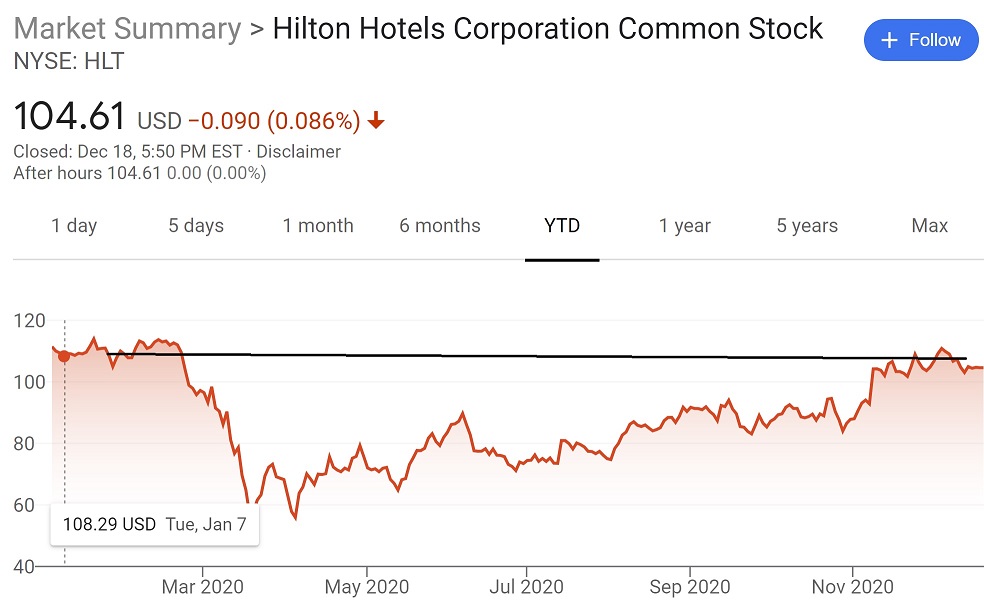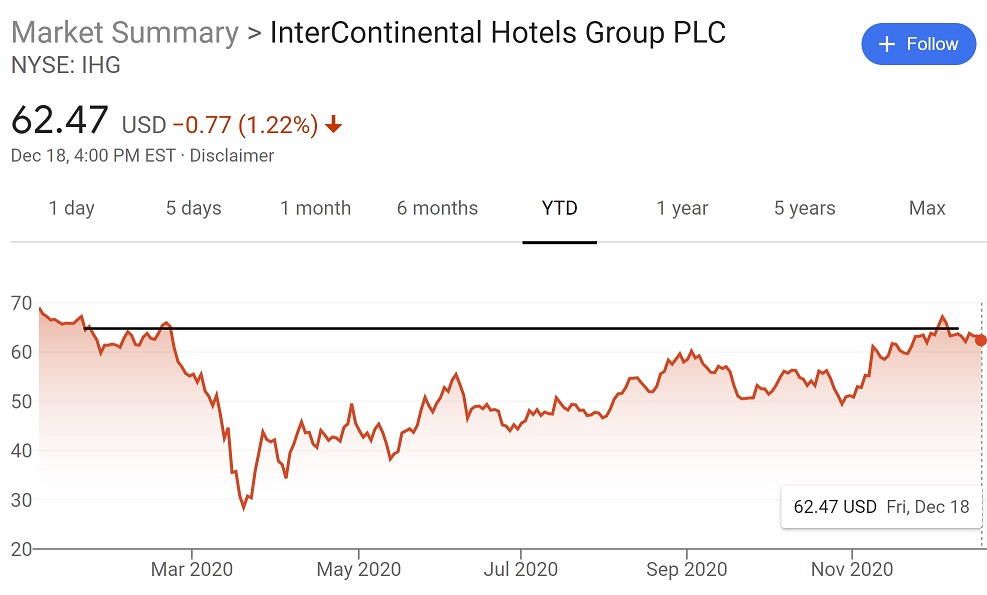I invest almost entirely in broad market index funds. I don’t spend all my time figuring out how to beat the market, and most really smart people who do still get killed half the time. I believe the average person is best off investing with Jack Bogle – betting on the market as a whole, and keeping fees low.
That said I still try to understand what’s driving the market and individual sectors. I was right five years ago about airline stocks. And I suggested many months ago that if you were a vaccine optimist then cruise lines would be a good investment, no matter how much they should be beaten down if vaccines came soon and were safe and efficacious then they’d been beaten up too much. Since we started getting readings from phase 3 trials we’ve seen a pop in those stocks.
Still, I was surprised by the overall performance of the market during the pandemic. I called recession at the start of March and that was correct, when betting markets only gave it a 50% chance. But I also thought the late March drop in stocks would persist. I assume the quick recovery in stocks was driven by the massive liquidity injections from the Federal Reserve (and by other central banks around the world) but there’s also research suggesting otherwise.
What I really don’t understand is hotel chain stock prices. How on earth are the market caps of hotel chains back to just about pre-pandemic levels?


U.S. hotel occupancy in November, by the way, was just 40.3%, down 34.5% year-over-year, with revenue per available room down 52.6%.
The discounted net present value of their future income streams has to be lower than people thought it was at the beginning of 2020, if for no other reason than post-pandemic business travel will be slow to return and some portion of business travel won’t come back at all. The vaccine trade alone can’t explain valuing hotels like the Before Times.
And surely Airbnb’s public offering, coming out with a bang, underscores that there’s more competition for transient lodging than had already been priced in. Airbnb is getting better for short stays, as they’ve pushed contactless check-in. And they don’t even have a loyalty program yet, so there’s still upside in that space alone.
I thought the housing market would collapse and cause a recession – back in 2006. My timing was off by two years. You don’t just need to know the eventual direction of a market to make money, you need to know timing too, or you’ll lose (at least on a relative basis).
I believe hotel chains must be overvalued now, since I have a hard time building a story that explains their return to pre-pandemic levels. But that doesn’t give me any kind of an edge in making money. Even if I’m right, does that mean hotel stocks will fall – or just rise more slowly than they otherwise would have? And even if they do fall, when will that happen? I have no idea. But I still wouldn’t buy them at current prices.


Stocks are forward looking. And the future looks bright for the travel industry. Investors love a comeback story.
One thing the pandemic has done is teach corporations to do more with less. At some point the industry will return to normal, but there will be less overheard — fewer headcount, fewer amenities, higher profits.
@ Jags — “fewer amenities, higher profits”…for AirBNB. If people are going to return to real hotels, they will be need to enticed by MORE amenities, not less.
I see point but I’m not so sure. Possible counter-arguments:
– Hotels chains aren’t as risky as airlines -> the long run matters more
– The crisis hasn’t really stopped or reversed the trend towards consolidation in the hotel industry. I find the airline industry is the much more complicated beast with governments being pretty active as opposed to letting the free market reign.
– I am still bullish on the important luxury segment in hotel industry. If that brings chains more growth than airlines, we should expect better stock performance even if discount rates/factors were the same across industries.
“Stocks are forward looking”: technically true, but also a dangerous cliche to rely upon to explain potentially irrational pricing. The same cliche was used in 1999 to explain the prices of so many tech/internet stocks at the time.
The forward looking aspect of stock picking is the trend now. Not just in hotels but in consumer cyclical stocks in general – e.g. Starbucks is near 52 week high. The hotel sector has a greater amount of risk – leisure travel may return in the next year but the new norm for business travel is uncertain and that is the foundation to long term high rate revenue. I’d be nervous about investing in travel stocks beyond the current vaccine comeback wave.
Simple – Hotel chains listed above do not own properties. They collect property management fees, but make money regardless of whether the property makes money or not.
The long term problem will be when these contracts expire with their owners, as property owners may very well look abandon brand names. You can see this trend with lesser known brands like Sonesta, as the number of hotels under management is increasing as contracts expire.
This cycle make several years and stock analysts are only looking at the shorter term.
The forward-looking argument is bunk. It implies that stocks should never go down, but are monotonically increasing, because the future — at some time interval — is ALWAYS bright. But is that 1-year out, 2 years, 5, 10, or 25?
I am absolutely convinced that the bubble we are in is fueled by a.) greed, and b.) 0% interest rates. When the majority of the population believes that the only way to make anything on their money is to put it in the market, then that’s what they do.
And like a table of old men sitting around a poker table continuing to ante-up while nervously glancing at everyone else, it will hold true. Until someone blinks.
Adding to @DanG’s comment above, hotels that cut their administrative/staffing expenses while continuing to collect property management fees should fare alright (at least for a while) in the Covid era.
Thanks to Hyatt’s Bonus Journeys/double nights promotion and reduced-for-2021 Globalist requirement, I’m on track to have more hotel activity from 10/2020 to 02/2021 than at any time since Summer 2018. They key difference being now they are personal/weekend staycations goosed by Hyatt’s promotions, versus business/weekday travel stays (at Marriott SpringHill Suites) back in 2018.
You have to keep this in perspective. Yes, the hotel management stocks (not the hotel property REITs like HST that are getting killed) have had a big jump recently. That is no surprise because of the good vaccine news. However, over the last 12 months these hotel stocks have underperformed the overall stock market (The S&P 500). So this recent jump is merely the hotel stocks playing catch up due to the good news.
As long as Washington keeps dropping money from helicopters, the market is going up. By chance just yesterday I had a conversation with the manager of a California extended stay hotel about her occupancy. She said it is 90% business over leisure, and that is 90% business that cannot telecommute, like construction.
I’ll keep a long story short. In short she said it had been many months since she had seen coat-and-tie business guests, and had just been talking to the hotel owner about whether or not that segment would ever return.
The only thing to realize about the stock market is “nobody knows nothing.” Never has, never will.
All you can do if you want to time is buy when you think it is relatively low and sell when you think it is relatively high. Even then you will be wrong much of the time.
Or just keep buying a little in broad mutual funds all the time, figuring that human ingenuity and hard work over time is worth more than a couple percent you could get in bonds. Then a pend your time in your job.
How many people bought hand-over-fist in late March and admitted it at the time? Damn few. Even the supposed genius Buffett was dumping stuff then. And he has lagged the market over the last 15 years. I have beat the hell out of him.
When S&P 500 and similar indices are up around 15% YTD, going flat is not really “doing good” at all. They are actually doing miserable.
“And surely Airbnb’s public offering, coming out with a bang, underscores that there’s more competition for transient lodging than had already been priced in. Airbnb is getting better for short stays, as they’ve pushed contactless check-in. And they don’t even have a loyalty program yet, so there’s still upside in that space alone.”
With destination cities banning short term rentals and AirBnB painting a target on its back for avoiding hotel/occupancy taxes, I wouldn’t be so sure that AirBnB will as influential as you think outside of quaint destinations with low hotel density like wine country areas(but Temecula banned them so the first domino has already fallen in that segment).
I do feel that the drop in business travel will force hotels to be more competitive for tourists which people might conflate with AirBnB competition, and those hotel stocks will definitely be impacted when the vaccines reset us to “normal” and hotels find themselves well short of the business travel levels they had previously. I don’t see my line of work returning to previous levels of travel ever, as customers have realized how much money they save not putting a team of people up in a hotel for a year while getting the same things accomplished remotely
We are in a stock market bubble now, à la 2006. Unsustainable debt. Can’t continue. It’s all an illusion, Gary.
Even with pent-up demand, someone has to pay the piper, eventually, for these multi-trillion dollar stimulus packages.
The stock market has been divorced from reality for a while as it is now driven by HNIs, as opposed to retail mom and pop investors. You can see a disconnect across sectors.